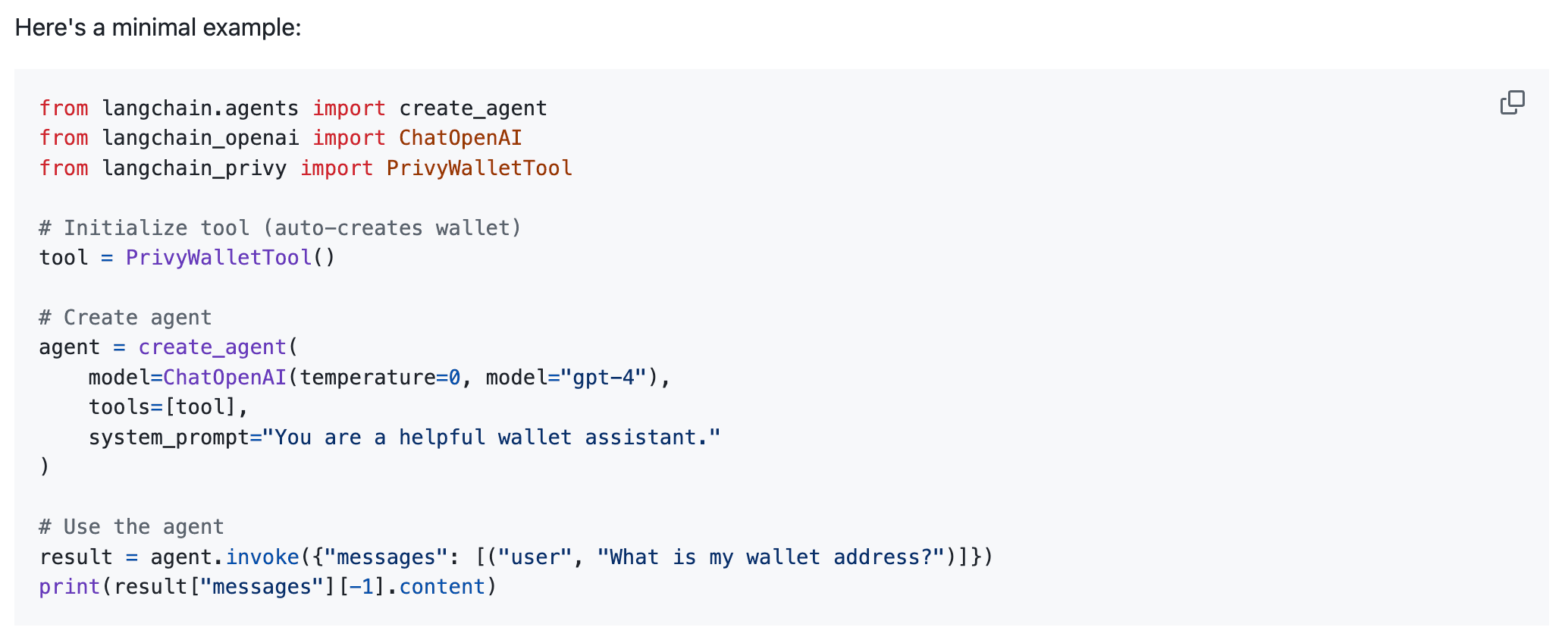Building agentic payments with LangChain and Privy
How Privy-powered wallets let AI agents securely hold and move value across use cases, from commerce to coordination
Madeleine Charity
|Nov 6, 2025

AI agents are becoming increasingly capable. Today, they can reason, plan, and act on our behalf across a growing number of domains. However, most share a limitation: they can’t transact.
Agentic payments mark the next frontier. By equipping agents with the ability to hold and move value safely, we open the door to a new wave of applications, such as autonomous systems that can pay for API calls, manage portfolios of digital assets, or even complete purchases for users.
One early use case is agentic commerce, where agents act as personal shoppers discovering, comparing, and completing transactions based on user preferences. But that’s just one example. The same foundations can enable agents to handle subscriptions, rebalance portfolios, tip creators, or even coordinate multi-party workflows.
As AI agents take on more decision-making, a new challenge emerges: How do these agents transact safely, transparently, efficiently, and at scale?
An introduction to Langchain
Agentic payments, as the name suggests, requires agents. LangChain has quickly become the go-to platform for agent engineering, providing open-source frameworks that make it easy for anyone to build and scale their first agent. Developers can orchestrate AI agents powered by the LLM of their choice, from OpenAI to Anthropic to Google and beyond. Today, teams at Rippling, Cloudflare, and others use LangChain’s products to design agents that can reason, plan, and act autonomously.
Like Privy, LangChain offers both pre-built architecture (LangChain) and low-level orchestration (LangGraph). Developers can get started quickly by connecting models in just a few lines of code, then extend functionality with LangGraph, which is ideal for advanced workflows that require deterministic logic, agentic reasoning, or custom latency controls.
In short, LangChain makes it possible to go from prompt to agent, turning AI models into systems that can not only think, but do.
Equipping agents with wallets
Today, AI agents can think, plan, and even communicate. However, transacting still relies on traditional rails, either by using a card on file, adhering to manual spend limits, or waiting for human approval. This setup works for simple automations, but quickly breaks down when agents need to operate autonomously or interact with other systems in real time.
This changes with a wallet, which provides an agent with native access to digital value.
An agent can now hold, move, and verify funds directly onchain, without relying on human intervention. The benefits extend beyond payments.
Identity and trust: A wallet gives every agent a unique cryptographic identity, allowing it to sign messages, verify intent, and authenticate actions securely.
Autonomy with guardrails: Transaction policies and permissions can be enforced at the wallet level, defining where, when, and how an agent can move funds.
Programmable execution: Wallets can also turn transactions into logic, enabling agents to automate complex financial flows like payments, transfers, or rebalancing strategies.
Interoperability: Built on crypto rails, wallets allow agents to easily plug into or interact with other onchain systems.
With wallets, agents gain the ability to act, but humans still define the rules. Developers can set the policies, limits, and permissions that determine how an agent behaves. It’s a model where autonomy is programmed, not assumed: agents execute, but always in service of human intent.
Building on LangChain with Privy
Privy brings secure, production-ready wallet infrastructure to LangChain agents, giving them the ability to hold, move, and manage digital assets safely at scale.
With this new integration, developers can create agents that can:
Automatically spin up wallets
Make payments in a variety of assets (including stablecoins)
Sign messages and transactions
Query wallet balances or addresses
In this example, a user can interact with an agent in natural language, asking questions like “What is my wallet address?” or “Check my balance on Ethereum.”
Under the hood, Privy abstracts away the complexity of blockchain interactions. Wallets are created and managed automatically. This means no seed phrases, no private key management, nor manual setup. Each agent gets a wallet secured by Privy’s architecture, built on trusted execution environments (TEEs) and combined with key sharding to ensure assets are safe, even as agents act autonomously.
To get started, LangChain developers can initialize a PrivyWalletTool(), attach it to their agent, and immediately enable onchain actions like signing, sending, or checking balances.

For now, the repo focuses on the fundamentals, such as creating wallets, signing messages, and executing transactions. Future iterations will expand what agents can understand and do, from policy-aware transaction logic to richer multi-agent coordination.
With these building blocks in place, developers can begin experimenting not only with agent-to-human interactions, but also agent-to-agent payments. By allowing agents to fund, compensate, or settle with each other directly, new patterns of coordination become possible. Agents can begin to outsource work, pool resources, or even exchange services on behalf of users.
This first release is the foundation of a broader effort to connect AI agents to the world of value transfer. It marks a step toward a future where intelligent systems don’t just reason or recommend, but can also transact securely and transparently.
What’s next
Beyond payments, wallets could also become a way for agents to prove who they are and act on behalf of users. In time, the same tools that let agents send money might also let them sign approvals, confirm identity, or authorize actions across different systems.
With Privy and LangChain, developers can now begin experimenting with agentic payments, and transforming the way both users and agents interact and transact on the Internet.
Explore the repo and start building.
We’d love to hear what use cases you are excited to see next. How do you imagine agents paying, funding, or collaborating with each other? Tell us what you’re building, and how Privy can help.

